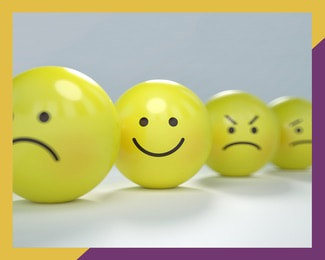PERSONAL RESILIENCE
When it comes to being victorious over the most complex circumstances, a positive mindset always works best. We now focus more about our mental well-being and that’s not just because more people are suffering from stress, anxiety and depression but because we are finally recognising its vital role when it comes one’s performance and engagement with other people, our work and one’s life in general.
To recognize the importance of mental wellbeing and personal resilience we can refer to the conclusions from several physiological studies (Beyond Trauma and Resilience, George A. Bonanno, 2006) as well as some of the first ones some 40 years ago (Garmezy, 1974).
These studies looked at why some individuals reacted differently when faced with challenging life events, why some people could experience post traumatic growth while others suffered for a long time.
Most of the studies came to the conclusion that being resilient played a key part in the process.
To recognize the importance of mental wellbeing and personal resilience we can refer to the conclusions from several physiological studies (Beyond Trauma and Resilience, George A. Bonanno, 2006) as well as some of the first ones some 40 years ago (Garmezy, 1974).
These studies looked at why some individuals reacted differently when faced with challenging life events, why some people could experience post traumatic growth while others suffered for a long time.
Most of the studies came to the conclusion that being resilient played a key part in the process.
What is personal resilience in the first place?
Resilience is often described as the ability to bend and not break, to bounce back in the face of adversity. This simple sentence is however hiding all the challenges behind learning to be resilient, the adjustments a person has to do in order to become stronger and grow.
Resilience is often described as the ability to bend and not break, to bounce back in the face of adversity. This simple sentence is however hiding all the challenges behind learning to be resilient, the adjustments a person has to do in order to become stronger and grow.
There is a lot you can do to strengthen your personal resilience, in the 16-page 'Little Guide to Building Resilience', you will find 7 insights into resilience and a lot of practical tools.
Below is the first one, get in touch if you would like me to send you the full guide.
Below is the first one, get in touch if you would like me to send you the full guide.
Personal Resilience #1 - Develop your self-awareness & praise yourself
In order to begin building your resilience, you have to develop self-awareness.
It implies, you have to be aware of yourself, who you are, what you are capable of, your limits, how you see yourself and how you treat yourself. When your knowledge of self is juxtaposed with people’s knowledge of you, you get a balanced picture of who you are, thereby, really knowing your strengths and your weaknesses.
Also, before you attempt building your resilience, it is best to have a good assessment of the level of your resiliency. A good source of assessment report are your friends, co-workers, and family members, they will be in a better to position to tell you how well you handle stress or pressure.
When we face stress or pressure, it unmasks a part of our personality that does not express itself when the going is good. Getting a good appraisal on your resilience will clue you in on how much work is needed to get your resiliency up to 21-century standard.
It implies, you have to be aware of yourself, who you are, what you are capable of, your limits, how you see yourself and how you treat yourself. When your knowledge of self is juxtaposed with people’s knowledge of you, you get a balanced picture of who you are, thereby, really knowing your strengths and your weaknesses.
Also, before you attempt building your resilience, it is best to have a good assessment of the level of your resiliency. A good source of assessment report are your friends, co-workers, and family members, they will be in a better to position to tell you how well you handle stress or pressure.
When we face stress or pressure, it unmasks a part of our personality that does not express itself when the going is good. Getting a good appraisal on your resilience will clue you in on how much work is needed to get your resiliency up to 21-century standard.
How do I do this?
A good start is to take some time aside and ask yourself some key questions and then have the courage to ask close friends, co-workers and managers to answer them too. At time being self-aware can take some courage, asking for feedback and learning to receive it can be challenging, but without it we seldom grow.
Thank people for their feedback and look at the common themes. Once you have identified these themes, use the information to improve yourself and your life. Repeat the good stuff and implement actions to work on the constructive comments you feel are valid.
Some questions you can start with:
Thank people for their feedback and look at the common themes. Once you have identified these themes, use the information to improve yourself and your life. Repeat the good stuff and implement actions to work on the constructive comments you feel are valid.
Some questions you can start with:
- What are my strengths?
- What are the most important things in my life, what do I value, what do I feel passionate about?
- How do I describe myself?
- I am living in coherence with my beliefs and my values?
- Who are the most important people in my life?
- What is the quality of my relationships with others? Am I putting enough effort into the important relationships in my life?
- What is my goal in life? What are my goals for the near future?
- What’s my definition of success?
- What do I think about myself?
- Am I mostly thinking positive or negative thoughts?
- What do I want to portray to others?
- What stresses me out?
- How do I react when I am under pressure?
- How resilient am I?
- What do I do to look after myself?
- How am I doing at work? Am I putting enough effort into my work?
- What energises me?
- What bores me? Makes me feel tired?
- If you could not fail and if there were no limitations, if you could do anything, what would I choose to do? Etc.
You will find the other 6 insights and more tips in 'The Little Guide To Building Resilience'. I'll be happy to send you a free copy, just get in touch!


